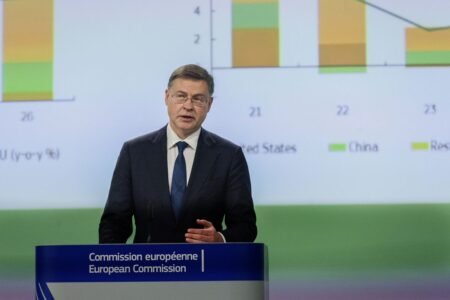(BRUSSELS) – The European economy held up well in the first quarter of 2023 in the face of Russia’s aggression against Ukraine, the EU reported on Monday, leading to an upgrade in its growth forecast for the year.
Europe’s economy has avoided recession, according to Monday’s spring economic forecast, with lower energy prices and a strong labour market supporting moderate growth in the first quarter of 2023.
The better-than-expected start to the year lifts the growth outlook for the EU economy to 1.0% in 2023 (0.8% in the Winter interim Forecast) and 1.7% in 2024 (1.6% in the winter). Upward revisions for the euro area are of a similar magnitude, with GDP growth now expected at 1.1% and 1.6% in 2023 and 2024 respectively. On the back of persisting core price pressures, inflation has also been revised upwards compared to the winter, to 5.8% in 2023 and 2.8% in 2024 in the euro area.
However, “risks remain too plentiful for comfort and Russia’s brutal invasion of Ukraine continues to cast a shadow of uncertainty over the outlook,” said Paolo Gentiloni, the EU’s Economy Commissioner: “We must remain vigilant – and stand ready to respond to any future shocks with the same unity and determination that saw us through these past three stormy years.”
The EU’s Spring 2023 Economic Forecast shows that the European economy managed to contain the adverse impact of Russia’s war of aggression against Ukraine, weathering the energy crisis thanks to a rapid diversification of supply and a sizeable fall in gas consumption. Markedly lower energy prices are working their way through the economy, reducing firms’ production costs. Consumers are also seeing their energy bills fall, although private consumption is set to remain subdued as wage growth lags inflation.
But as inflation remains high, financing conditions are set to tighten further. Though the ECB and other EU central banks are expected to be nearing the end of the interest rate hiking cycle, the recent turbulence in the financial sector is likely to add pressure to the cost and ease of accessing credit, slowing down investment growth and hitting in particular residential investment.
Headline inflation, after peaking in 2022, continued to decline in the first quarter of 2023 amid a sharp deceleration of energy prices. Core inflation (headline inflation excluding energy and unprocessed food) is, however, proving more persistent. In March it reached a historic high of 7.6%, but it is projected to decline gradually over the forecast horizon as profit margins absorb higher wage pressures and financing conditions tighten. The April flash harmonised index of consumer prices estimate for the euro area, released after the cut-off date of this forecast, shows a marginal decline in the rate of core inflation, which suggests that it might have peaked in the first quarter, as projected. On an annual basis, core inflation in the euro area in 2023 is set to average 6.1%, before falling to 3.2% in 2024, remaining above headline inflation in both forecast years.
The labour market has remained resilient against economic slowdown, syas the report, with the EU unemployment rate hitting a new record low of 6.0% in March 2023, and participation and employment rates are at record highs.
The EU labour market is expected to react only mildly to the slower pace of economic expansion. Employment growth is forecast at 0.5% this year, before edging down to 0.4% in 2024. The unemployment rate is projected to remain just above 6%. Wage growth has picked up since early 2022 but has so far remained well below inflation. More sustained wage increases are expected on the back of persistent tightness of labour markets, strong increases in minimum wages in several countries and, more generally, pressure from workers to recoup lost purchasing power.
Public deficits are set to decrease especially in 2024. Despite the introduction of support measures to mitigate the impact of high energy prices, strong nominal growth and the unwinding of residual pandemic-related measures led the EU aggregate government deficit in 2022 to fall further to 3.4% of GDP. In 2023 and more markedly in 2024, falling energy prices should allow governments to phase out energy support measures, driving further deficit reductions, to 3.1% and 2.4% of GDP respectively. The EU aggregate debt-to-GDP ratio is projected to decline steadily to below 83% in 2024 (90% in the euro area), which is still above the pre-pandemic levels. There is a large heterogeneity of fiscal trajectories across Member States.
The report warns that downside risks to the economic outlook have increased. More persistent core inflation could continue restraining the purchasing power of households and force a stronger response of monetary policy, with broad macro-financial ramifications. Moreover, renewed episodes of financial stress could lead to a further surge in risk aversion, prompting a more pronounced tightening of lending standards than assumed in this forecast. An expansionary fiscal policy stance would fuel inflation further, leaning against monetary policy action. In addition, new challenges may arise for the global economy following the banking sector turmoil or related to wider geopolitical tensions. On the positive side, more benign developments in energy prices would lead to a faster decline in headline inflation, with positive spillovers on domestic demand. Finally, there is persistent uncertainty stemming from Russia’s ongoing invasion of Ukraine.
The forecast publication includes for the first time an overview of the economic structural features, recent performance and outlook for Ukraine, Moldova and Bosnia and Herzegovina, which were granted candidate status for EU membership by the Council in June and December 2022.








